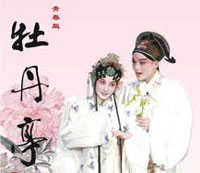Difference between revisions of "CIIC:Today's featured article/July 16, 2015"
From Wiki China org cn
imported>Ciic (Created page with 'thumb|250px|left|The Peony Pavilion The great classical stage art of Kunqu is an ancestor of Peking Opera that first became popular in ...') |
imported>Ciic |
||
| (One intermediate revision by the same user not shown) | |||
| Line 1: | Line 1: | ||
[[file: The Peony Pavilion.JPEG|thumb|250px|left|The Peony Pavilion]] | [[file: The Peony Pavilion.JPEG|thumb|250px|left|The Peony Pavilion]] | ||
| − | + | ''The Peony Pavilion'' ('''牡丹亭'''), written in 1598, has long been considered the greatest Kunqu opera of all time. Its author was [[Tang Xianzu]], who lived from 1550 to 1617. A native of [[Jiangxi Province]], Tang was widely recognized as a man of immense learning, yet he failed to thrive as a government official. Exile, demotion and poverty marked his official career, but he left behind five Kunqu operas, among them ''The Peony Pavilion''. ([[The Peony Pavilion|More...]]) | |
| − | |||
| − | |||
| − | ''The Peony Pavilion'' ('''牡丹亭'''), written in 1598, has long been considered the greatest Kunqu opera of all time. Its author was [[Tang Xianzu]], who lived from 1550 to 1617. A native of [[Jiangxi Province]], Tang was widely recognized as a man of immense learning, yet he failed to thrive as a government official. Exile, demotion and poverty marked his official career, but he left behind five Kunqu operas, among them ''The Peony Pavilion''. ([[Peony Pavilion|More...]]) | ||
Latest revision as of 06:47, 16 July 2015
The Peony Pavilion (牡丹亭), written in 1598, has long been considered the greatest Kunqu opera of all time. Its author was Tang Xianzu, who lived from 1550 to 1617. A native of Jiangxi Province, Tang was widely recognized as a man of immense learning, yet he failed to thrive as a government official. Exile, demotion and poverty marked his official career, but he left behind five Kunqu operas, among them The Peony Pavilion. (More...)
